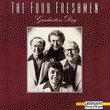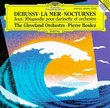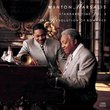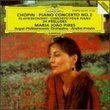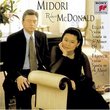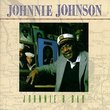| All Artists: Claude Debussy, Maurizio Pollini Title: Debussy: Preludes, Vol. 1 / L'isle joyeux Members Wishing: 1 Total Copies: 1 Label: Deutsche Grammophon Release Date: 11/9/1999 Genre: Classical Styles: Chamber Music, Historical Periods, Classical (c.1770-1830) Number of Discs: 1 SwapaCD Credits: 1 UPC: 028944518726 |
Search - Claude Debussy, Maurizio Pollini :: Debussy: Preludes, Vol. 1 / L'isle joyeux
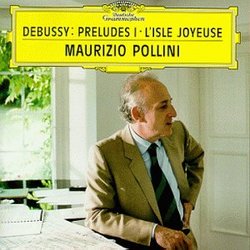 | Claude Debussy, Maurizio Pollini Debussy: Preludes, Vol. 1 / L'isle joyeux Genre: Classical
Maurizio Pollini brings cool elegance and unflappable sheen to Debussy's Preludes Book One. He contours the dynamics with micromanaged aplomb, and achieves ravishing pedal effects in the more meditative selections. One can... more » ![header=[] body=[This CD is available to be requested as disc only.]](/images/attributes/disc.png?v=15401716) ![header=[] body=[This CD is unavailable to be requested with the disc and back insert at this time.]](/images/attributes/greyed_disc_back.png?v=15401716) ![header=[] body=[This CD is unavailable to be requested with the disc and front insert at this time.]](/images/attributes/greyed_disc_front.png?v=15401716) ![header=[] body=[This CD is unavailable to be requested with the disc, front and back inserts at this time.]](/images/attributes/greyed_disc_front_back.png?v=15401716) |
Larger Image |
CD DetailsSynopsis
Amazon.com Maurizio Pollini brings cool elegance and unflappable sheen to Debussy's Preludes Book One. He contours the dynamics with micromanaged aplomb, and achieves ravishing pedal effects in the more meditative selections. One can't find fault with the pianist's well-oiled fingerwork and beautifully modulated sonority. Yet the music's evocative, dreamlike qualities elude Pollini's protean grasp, especially compared to Arrau's robust inflections, Paul Jacobs's aching poetry, and Zaidee Parkinson's haunting rumination. Pollini dispatches the neo-Lisztian hurdles of L'Isle Joyeuse with efficient ease, holding himself aloof from the orgiastic abandon characterizing more memorable readings from Jean-Yves Thibaudet, Vladimir Horowitz, and Walter Gieseking. DG's engineering is resplendent and well-focused. --Jed Distler Similarly Requested CDs
|
CD ReviewsExquisite readings scarecrow | Chicago, Illinois United States | 04/05/2005 (5 out of 5 stars) "I grew up on Giesiking n' thought the choice of tempi, sensibility, coolness he brought was definitive, but these pieces grow, a piece of music transforms itself over time,like taking a photo of the same street,things change (not just the obvious either) this is what many I think refuse to comprehend, conductors who think they for instance know the correct tempi, no one else of course knows, only thet KNOW.We also have lived through quite a bit of modernity, the experience of hearing new works all has some influence on what we hear right, at least I would think so,Arrogance of what musicians think they know serves no end and renders music into a museum,sterile, cold, not alive,(look at the fine readings of Bruckner and Mahler Boulez was able to summon,something I saw many years ago,(see my Bruckner 8th recording review with DGG; Boulez/Vienna)( But when it occurred no one thought Boulez could do anything new or innovative with post-Romantics.) Pollini although he takes liberties in tempi are infintesimal in terms of the exciting engaging gesturing he gets, he never sacrifices a fascinating timbre,as in "le vent sur. . . " he allows Debussy's modernity to come to full fruition, the piano sonoric canvas is well balanced as well,as in "voiles,where he plays with the overtones heard, a real modernist and the opening, "Danses des Delphes",here the balance is extraordinary,as in the "Les parfums. . . " where he plays it like a salon piece for which it is partially intended,(Debussy was strongly influenced by Erik Satie,the realm of simplicity before all else)this Pollini does in order to make music live I think you need to bring these other-lifeworld qualities and sensibilities to the music otherwise it is simply predictable music making, music to watch the clock with, Debussy strove to transcend the mere obvious, he broke all the rules for timbre,and time,spatializations of timbres(his ballet "Jeux" is a better example of the highest sophisticated sense of musical space) for love of timbre, and Pollini fully appreciates this aspect of his aesthetic. Technique and the modern sensibility is a mere given in Pollini I think it allows him again to project the colours anywhere he wants without sacrificing line nor melodic direction. His tone is a bit more fluffier at times than Zimerman,who has a more modern approach with a cold aggressive granite tone that also works quite well if you light a fire under this. Pollini is somewhere in between he has the discipline but doesn't allow it to consume the readings where the "preludes" are such and nothing else. I think what we want out of a pianist is to always search for another dimension of the music; if it exists, if not! one hearing is enough." A new hit for the greatest living pianist Daniel ZUFFEREY | Montreux, Switzerland | 01/12/2000 (5 out of 5 stars) "Pollini's fans were gifted in 1999. After the two Brahms Piano Concertos and especially Chopin's Ballades - one of the greatest CDs ever recorded - the Maestro brings Debussy's Preludes up to a new standard of perfection. Benedetti-Michelangeli was great in Debussy. Under Pollini's fingers, these twelve intimate gems recover all their poetry. The sound is, at the same time, very pure and full of spaces, the space between the notes that is called "music". I heard these Preludes live in Amsterdam. Miracle: the recording offers the same emotion and tears. Thank you, Maestro !" Oh My God! Itamar Axelrod | Haifa Israel | 01/02/2000 (5 out of 5 stars) "Playing at the highest level. Pollini's playing of the preludes can be compared only with Walter Gieseking 1950's recording's. An astonishing achievment and the recording quality is clear and resonant. Now we wait for the next instalment of Debussy's works for piano (hopefully the Preludes Book II) played by Pollini."
|

 Track Listings (13) - Disc #1
Track Listings (13) - Disc #1